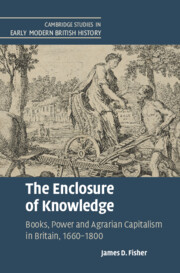Book contents
- The Enclosure of Knowledge
- Cambridge Studies in Early Modern British History
- The Enclosure of Knowledge
- Copyright page
- Dedication
- Contents
- Figures
- Tables
- Acknowledgements
- Notes
- Abbreviations
- Introduction
- Chapter 1 Rethinking Agricultural Books, Knowledge and Labour
- Chapter 2 Learning without Books
- Chapter 3 Standing on the Shoulders of Peasants
- Chapter 4 Learning without Labour
- Chapter 5 Dividing Head and Hand
- Chapter 6 Monopolising Knowledge
- Chapter 7 The Master Should Know More
- Conclusion
- Appendix
- Bibliography
- Index
Chapter 5 - Dividing Head and Hand
Gentleman Farmers, Agriculturists and Expertise
Published online by Cambridge University Press: 07 July 2022
- The Enclosure of Knowledge
- Cambridge Studies in Early Modern British History
- The Enclosure of Knowledge
- Copyright page
- Dedication
- Contents
- Figures
- Tables
- Acknowledgements
- Notes
- Abbreviations
- Introduction
- Chapter 1 Rethinking Agricultural Books, Knowledge and Labour
- Chapter 2 Learning without Books
- Chapter 3 Standing on the Shoulders of Peasants
- Chapter 4 Learning without Labour
- Chapter 5 Dividing Head and Hand
- Chapter 6 Monopolising Knowledge
- Chapter 7 The Master Should Know More
- Conclusion
- Appendix
- Bibliography
- Index
Summary
Chapter 5 shifts focus to consider the social effects of the appropriation and codification of the art of husbandry by examining the impact of books on new divisions of labour. It argues that agricultural books facilitated the increasing separation between intellectual and manual labour; a task division between those who exercised knowledge on a specific farm or estate and those who followed instructions, and a social division between those who produced knowledge and those who applied it in practice. The former was manifested in the figure of the gentleman farmer who managed with a pen, and the latter was manifested in the ‘agriculturist’, whose contribution to farming was primarily theoretical. Both were expressions of a new book-based agricultural expertise distinct from local custom and experience. The cumulative effect of print was to shape a new social system of agricultural knowledge in which cultivation was directed by men with such expertise, which we can call agriculturism.
Keywords
- Type
- Chapter
- Information
- The Enclosure of KnowledgeBooks, Power and Agrarian Capitalism in Britain, 1660–1800, pp. 170 - 204Publisher: Cambridge University PressPrint publication year: 2022

